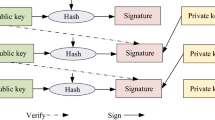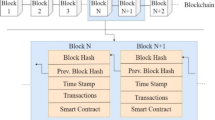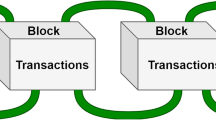Abstract
Cognitive radio networks (CRs) are used whenever intelligent channel selection is needed. Using CR, the trans receiver is able to send scan signals on the network to evaluate if the network is free or not. Once the scan is complete, then data communication is performed on the network. In order to optimize the network performance, various state-of-the-art approaches are proposed which optimize the quality of service (QoS) parameters like end-to-end communication delay, throughput, energy consumption, packet delivery ratio, etc. While optimizing these QoS parameters, there are certain security loop holes created in the CRNs. Due to these loop holes, the sensing capabilities of the CR nodes get affected as attackers induce invalid signatures on the nodes, thereby making them misbehave. In order to reduce these attacks, this paper introduces a blockchain based approach to secure the cognitive radio network. But due to the inclusion of a security framework, the network QoS reduces. In order to reduce the effect of blockchain on QoS, an adaptive Artificial Intelligence (AI) is incorporated into the network. This AI layer is responsible for enhancing the QoS performance, while kee** the CRN secure. The AI layer uses sidechains in order to perform this task. This work is observed to have a 20% higher trust level than non-blockchain based security algorithms, while maintaining a 10% improvement in the overall network QoS.
Access this chapter
Tax calculation will be finalised at checkout
Purchases are for personal use only
Similar content being viewed by others
References
Rathee G, Ahmad F, Kurugollu F, Azad MA, Iqbal, Imran M (2020) CRT-BIoV: a cognitive radio technique for blockchain-enabled internet of vehicles. IEEE Trans Intell Transp Syst
Kotobi K, Bilen SG (2017) Blockchain—enabled spectrum access in cognitive radio networks. IEEE
Oyewobi SS, Djouani K, Kurien AM (2020) A review of industrial wireless communications, challenges, and solutions: a cognitive radio approach. https://doi.org/10.1002/ett.4055
Appavualias Balamurugan S, Senthil Kumar S (2019) IDsMA: an integrated digital signature and mutual authentication mechanism for securing the cognitive radio networks. https://doi.org/10.1002/dac.4289
Kumar S, Sharma B, Singh AK (2020) An efficient algorithm for backbone construction in cognitive radio networks. https://doi.org/10.1002/dac.4345
Ni W, Zhang Y, Li W (2019) Optimal admission control for secondary users using blockchain technology in cognitive radio networks. https://doi.org/10.1109/ICDCS.2019.00151
Elangovan K, Subashini S (2018) Particle bee optimized convolution neural network for managing security using cross-layer design in cognitive radio network. https://doi.org/10.1007/s12652-018-1007-9
Jang S-J, Han C-H, Lee K-E, Yoo S-J (2019) Reinforcement learning-based dynamic band and channel selection in cognitive radio ad-hoc networks. https://doi.org/10.1186/s13638-019-1433-1
Li F, Lam K-Y, Sheng Z, Zhang X, Zhao K, Wang L (2018) Q-learning-based dynamic spectrum access in cognitive industrial internet of things. https://doi.org/10.1007/s11036-018-1109-9
Bansal S, Rattan M (2019) Design of cognitive radio system and comparison of modified whale optimization algorithm with whale optimization algorithm.https://doi.org/10.1007/s41870-019-00346-2
Mourad Mabrook M, Taha HA, Hussein AI (2020) Cooperative spectrum sensing optimization based adaptive neuro-fuzzy inference system (ANFIS) in cognitive radio networks. https://doi.org/10.1007/s12652-020-02121-9
Shah-Mohammadi F, Kwasinski A (2018) Deep reinforcement learning approach to QoE-driven resource allocation for spectrum underlay in cognitive radio networks. IEEE
Kaur A, Kumar K (2020) Energy-efficient resource allocation in cognitive radio networks under cooperative multi-agent model-free reinforcement learning schemes. https://doi.org/10.1109/TNSM.2020.3000274
Kaur A, Kumar K (2020) Imperfect CSI based intelligent dynamic spectrum management using cooperative reinforcement learning framework in cognitive radio networks. https://doi.org/10.1109/TMC.2020.3026415
Malik TS, Hasan MH (2020) Reinforcement learning-based routing protocol to minimize channel switching and interference for cognitive radio networks. https://doi.org/10.1155/2020/8257168
Ozturk M, Akram M, Hussain S, Imran MA (2019) Novel QoS-aware proactive spectrum access techniques for cognitive radio using machine learning 7. https://doi.org/10.1109/ACCESS.2019.2918380
Liu S, Hu K, Ni W, Xu Z, Wang F, Wan Z (2019) A cognitive relay network throughput optimization algorithm based on deep reinforcement learning. https://doi.org/10.1155/2019/2731485
Azzaoui AE, Singh SK, Pan Y, Park JH (2020) Block5GIntell: blockchain for AI-enabled 5G networks 8. https://doi.org/10.1109/ACCESS.2020.3014356
Hlophe MC, Maharaj BT (2020) QoS provisioning and energy saving scheme for distributed cognitive radio networks using deep learning 22(3)
Liu Y, Richard Yu F, Li X, Ji H, Leung VCM (2020) Block chain and machine learning for communications and networking systems. https://doi.org/10.1109/COMST.2020.2975911
Chen X, Li Z, Zhang Y, Long R, Yu H, Du X, Guizani M (2018) Reinforcement learning–based QoS/QoE—aware service function chaining in software-driven 5G slices. https://doi.org/10.1002/ett.3477
Salameh HB, Al-Nusair N, Alnabelsi H, Darabkh KA (2020) Channel assignment mechanism for cognitive radio network with rate adaptation and guard band awareness: batching perspective. https://doi.org/10.1007/s11276-020-02344-w
Hossain E, Niyato D, Kim DI (2013) Evolution and future trends of research in cognitive radio: a contemporary survey. Wirel Commun Mobile Comput. https://doi.org/10.1002/wcm.2443
Yao W, Yahya A, Khan F, Tan Z, Rehman AU, Chuma JM, Jan MA, Babar M (2019)A secured and efficient communication scheme for decentralized cognitive radio-based internet of vehicles 7. https://doi.org/10.1109/ACCESS.2019.2945610
Hill E, Sun H (2018) Double threshold spectrum sensing methods in spectrum-scarce vehicular communications. https://doi.org/10.1109/TII.2018.2816580
Thakur P, Kumar A, Pandit S, Singh G, Satashia SN (2017) Performance analysis of high-traffic cognitive radio communication system using hybrid spectrum access, prediction and monitoring techniques. Wirel Netw. https://doi.org/10.1007/s11276-016-1440-7
Alizadeh A, Bahrami HR, Maleki M (2016) Performance analysis of spatial modulation in overlay cognitive radio communications. IEEE Trans Commun. https://doi.org/10.1109/TCOMM.2016.2581817
Rahman MA, Rashid MM, Shamim Hossain M, Hassanain E, Alhamid MF, Guizani M (2019) Blockchain and IoT-based cognitive edge framework for sharing economy services in a smart city. Special section on artificial intelligence and cognitive computing for communication and network. IEEE Access. https://doi.org/10.1109/Access.2019.2896065
Zheng S, Han T, Jiang Y, Ge X (2020) Smart contract-based spectrum sharing transactions for multi-operators wireless communication networks. ar**v:2002.00771v2 [cs.NI]
Careem MAA, Dutta A (2019) SenseChain: blockchain based reputation system for distributed spectrum enforcement. In: IEEE international symposium on dynamic spectrum access networks (DySPAN)
Xu H, Klaine PV, Onireti O, Cao B, Imran M, Zhang L (2020) Blockchain-enabled resource management and sharing for 6G communications. Digital Commun Netw
Author information
Authors and Affiliations
Editor information
Editors and Affiliations
Rights and permissions
Copyright information
© 2022 The Author(s), under exclusive license to Springer Nature Singapore Pte Ltd.
About this paper
Cite this paper
Chopade, S.S., Dalu, S.S. (2022). Improving Security with Optimized QoS in Cognitive Radio Networks Using AI Backed Blockchains. In: Kumar, A., Mozar, S. (eds) ICCCE 2021. Lecture Notes in Electrical Engineering, vol 828. Springer, Singapore. https://doi.org/10.1007/978-981-16-7985-8_65
Download citation
DOI: https://doi.org/10.1007/978-981-16-7985-8_65
Published:
Publisher Name: Springer, Singapore
Print ISBN: 978-981-16-7984-1
Online ISBN: 978-981-16-7985-8
eBook Packages: EngineeringEngineering (R0)




